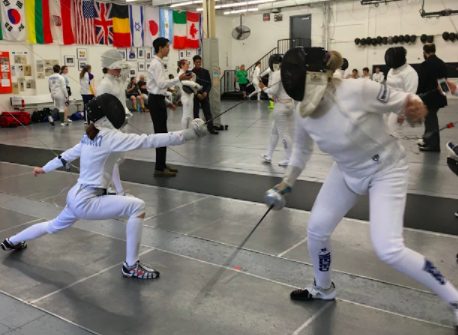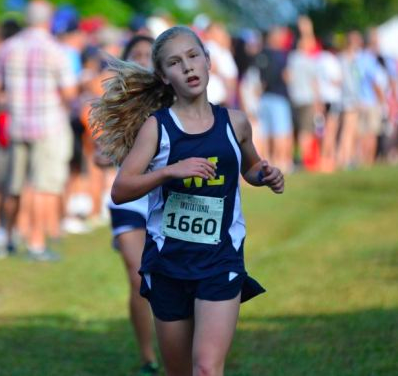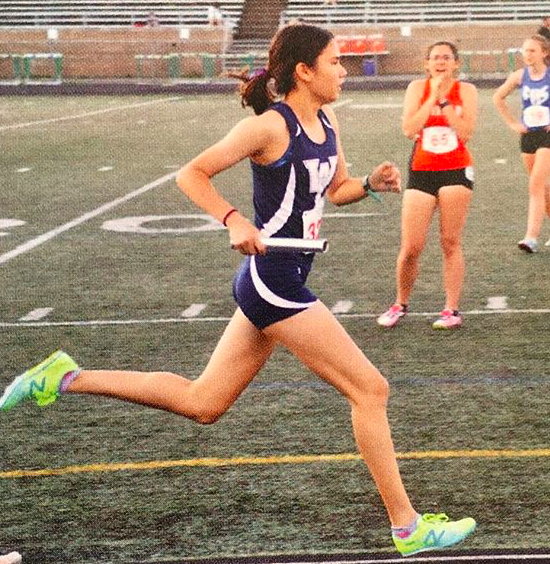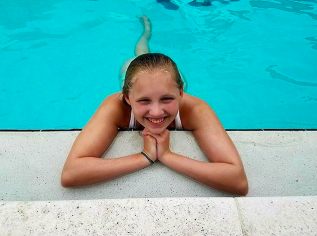W-L junior Olympians find inspiration close to home
January 25, 2018
Various associations throughout the world bring together young athletes in a competition of nationally ranked athletes, called junior Olympics. Our school is lucky to be home to several junior Olympian competitors in a variety of sports, such as running and fencing. Associations like the USA Track and Field (USATF) and USA Fencing sponsor these competitions, which often act as a home for future Olympians to hone their talents. Other athletes not interviewed include Jabari Bennett, a shot-putter and Jack Steuble, a fencer.
Hannah Dembosky

Junior Hannah Dembosky
How old are you? What grade are you in?
I’m 16 and a junior.
What is the most recent national level competition you have competed in for fencing? How was that?
The most recent national competition I fenced in was actually this past weekend in Virginia Beach. It didn’t go well but I fenced some of the best people I’ve ever fenced, so it was a great learning experience and was still super fun.
When did you start fencing?
I started fencing when I was seven after watching the U.S. women’s saber team sweep the podium in the Beijing Olympics.
What have you done to get better at fencing?
To get better at fencing I’ve mostly been trying to go to practice as much as possible and compete in as many tournaments as I can. One thing that has really helped me improve is fencing really good and experienced fencers.
How has your sport influenced your daily life?
Fencing has influenced my daily life significantly because I try to practice as many days as possible, which makes me very busy. It also has generally helped me become more focused and motivated because fencing is really as much a mental sport as a physical one, and if you’re not focused, you really can’t do well.
What tips do you have for aspiring fencers?
For aspiring fencers I’d say just get to practice as many times as you can and go to tournaments with people who are better than you. Challenging yourself by fencing better people really pushes you to improve quickly.
What are some of your hobbies outside of fencing?
Outside of fencing I play violin, am on the W-L debate team, am in Key Club, play violin in the pit orchestra for the musical and am a connect mentor.
Has any person or coach inspired you to work harder?
My coach has really inspired me by pushing me to work harder and encouraging me, and in general all of the really good people I’ve fenced have inspired me to push myself to improve.
Do you want to go into a profession that deals with fencing?
I don’t want to go into a profession involving fencing but plan to continue fencing in and after college.
Anna Harpel

Sophomore Anna Harpel
When was your most recent national competition?
July. I competed at the USA Track and Field (USATF) Junior Olympics. I did a 4×800 [relay race].
When did you start running?
I was eight at Girls on the Run.
What have you done to practice or get better at running?
Just a lot of distance running and track.
How would you say that running influences your daily life?
It’s a driving factor in what I eat and how much food I get. It pushes me to eat right.
How do you push yourself mentally?
Every runner sets goals for themselves. I just keep in mind those goals if I’m doing it for somebody or for myself.
Who do you run for?
If my family is there. My dad pushes me a lot.
What tips to you have for someone who’s trying to become a national competitor?
Just practice a lot. Put everything you have into it. If you really want to reach your potential, you have to push yourself.
What are your hobbies?
I like to read and do yoga.
Who inspires you?
My dad inspires me. He’s run marathons, but he’s also just someone who really inspires me. Also, my cousin, she had cancer last year. She played field hockey in college. She’s a great athlete, and I just think about her.
Do you want to go into a profession that deals with running?
No. I’d run in college, though.
Jenny Gerson

Sophomore Jenny Gerson
How old are you? What sport do you play/ compete in?
I am 15 years old and compete in track.
What is the highest level competition you have ever competed in?
The highest level competition I’ve competed in for my club team is Junior Olympics, which is a national meet with three previous qualifying meets. Last year for Washington-Lee our 4x800m relay team made it to States.
When did you start playing your sport?
I started running when I was eight for fun. At the time I played a lot of other sports. Around 5th grade, I started specializing and taking track more seriously.
What have you done to practice or get better at your sport?
I run almost every day, sometimes twice a day. I am on two teams, Washington-Lee and a club (travel) team, after the regular high school season ends I compete with my club team. On top of running I strength train/ lift 2-3 days a week, cross train once a week (pool or bike) and stretch everyday. The little things I try to do such as staying hydrated, eating right and getting enough sleep can have big impacts on performance and help you feel better in general.
How has your sport influenced your daily life?
It’s a big time commitment. There are a lot of things I have given up to be able to practice and compete as much as I do. It isn’t easy knowing you could be hanging out with friends while having to go to practice or traveling for a meet. During the season, you have to be careful of what you do on a day to day basis so you don’t get injured or are able to perform at your best. Over the years I have given up other sports and activities to be able to focus on running.
What tips do you have for amateur athletes? Or aspiring Junior Olympics athletes?
Don’t compare yourself to others especially when you are starting a new sport or entering a new level of competition. Comparing yourself makes competing or playing mentally tougher than it already is. Everyone improves at different rates, the fastest person one year might not be the fastest the next.
What is a personal record (PR) for you or a personal best experience in your sport?
One of the best meets I had was last year’s outdoor conference meet. I was able to hit a new PR in the 800, qualify for Regionals in all three of my events (800, 4×400, 4X800) and had a really fun time running the 4×400 meter relay.
What are some of your other hobbies?
I enjoy baking and cooking.
Has anyone inspired you to work harder? Who?
My teammates and coaches inspire me to work harder. I don’t want to let them down since they put in a lot of time and energy and believe in me even when I don’t. When your doing a hard workout having teammates to push you can really make a big difference (thanks Margaux!).
Do you wish to go into a profession that deals with your sport? Do you want to compete in college and beyond?
Running D1 in college has definitely been one of my goals for the past couple of years, so hopefully I am able to compete in college. After college I would like to run as an amateur athlete. There are a lot of great clubs for people coming out of college who want to continue racing but don’t necessarily see it as a profession or want to pursue another career. I want to go into sports medicine as a profession, so that would mean helping athletes involved in all sports.
Margaux Reppert

Sophomore Margaux Reppert
How did you do at Nationals in your race with Anna Harpel and Jenny Gerson?
We did well. We actually got second place for the 4×800 relay, so that was really exciting.
Did you do anything other than the 4×8 there?
Also the 4×4, and in previous competitions I’ve run the 1500 and the 800.
When did you start running?
When I was nine.
What have you done to practice or get better at your sport?
It just takes a lot of effort. Working out every day and pushing through the setbacks and just taking breaks when you need them.
Mentally, how do you get through a difficult race or a hard run? How do you keep practicing and putting in effort?
I really just have to tell myself that that was one race. There’s going to be a lot more races coming up. Getting just a few seconds off is fine, and I can shave them off next time. ‘
Who has influenced you to run more?
My favorite Olympian is Alison Felix. She’s really awesome, and I love to watch her run because she makes it look easy.
How has your sport influenced you’re daily life?
Well, it’s really time consuming, but you get that good feeling after working out, so you just feel really good for the rest of the day even though it’s hard to do.
How do you manage your time?
I definitely get a lot of work done during the day so that you can stay after school until whenever practice is over, which changes, and then you can do stuff after school. Sometimes you have to stay up late or wake up early but you have to get it done.
What tips do you have for amateur athletes or aspiring Junior Olympic athletes?
I think anybody can do it but you have to really put in the effort. You can get better at anything, you just have to put in the time.
What is a personal record (PR) for you or a personal best experience in your sport?
For the 800, which is my main event, it would be 2:29.
What are some of your hobbies?
I’m in Girl Scouts, which is fun.
Has anyone inspired you to work harder?
I have a past coach, Coach Hank, who really helped me start. My high school coach now is Coach Drake, who is also really helpful, because even if you don’t have your best day at practice, he’s still encouraging.
Do you wish to go into a profession that deals with your sport?
I’m considering maybe going to college and running and seeing how that goes and maybe seeing if I want to continue it as a career, but most likely not, because I want to be a doctor.
Meghan Goodell

Sophomore Meghan Goodell
How old are you? What sport do you play/compete in?
I am 15-years-old, and I am a synchronized swimmer.
What is the highest level competition you have ever competed in?
Last July, I competed in Junior Olympic Nationals in Riverside, California.
When did you start playing your sport?
I starting swimming, dance and gymnastics at a very young age and when I was 10, I started a non competitive program because it kinda combines swimming, dance and gymnastics, which I was doing at the time. I started competing in the sport when I was 12.
What have you done to practice or get better at your sport?
I try really hard to make sure I’m productive at practice and not wasting time. I also make sure to stretch at home, so when I get in the pool I’m able to do my routines.
How has your sport influenced your daily life?
Being in synchronized swimming, I practice about 14 hours a week, so I have to have good time management skills to make sure I can get all of my homework done before practice.
What tips do you have for amateur athletes? Or aspiring Junior Olympics (JO) athletes?
For aspiring JO athletes, I would say the most important thing is to make the most out of practice, because for water sports, it can be really difficult to get pool time and I want to make sure I get the most out of the time I’m in the pool.
What is a personal record (PR) for you or a personal best experience in your sport?
The best experience in my sport was definitely going to Junior Olympics. Personally I got my highest scores there, and it was an amazing experience to be able to compete with so many really good athletes.
What are some of your other hobbies?
I play the violin in orchestra, and this fall I joined the cross country team for cross training, and I really liked it.
Has anyone inspired you to work harder? Who?
My teammates inspire me to work harder, because while it’s mostly a team sport there are definitely individual aspects to it so when I see them working hard, I want to work hard too.
Do you wish to go into a profession that deals with your sport? Do you want to compete in college and beyond?
I would really like to continue in college, and I think it would be really fun to coach. My coaches have worked really hard to help me get better, and I would really like to do the same for others.

